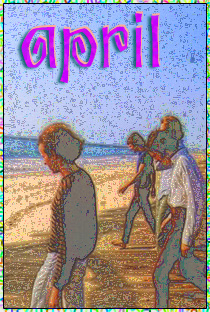|
THE FOLLOWING EVENTS TOOK PLACE ON APRIL 9
1667 - In Paris, The first public art exhibition is held at the Palais-Royale.
1682 - Robert La Salle claims the lower Mississippi River and all lands that touch it for France.
1821 - French poet, essayist and art critic Charles Baudelaire is born to a wealthy family in Paris. At 36, he published his only collection of poetry, Les Fleurs de Mal (The Flowers of Evil). His translations of Edgar Allan Poe's work will make Poe better known in France than in the United States.
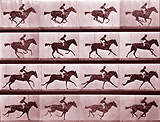
1830 - Eadweard Muybridge is born in Kingston-on-Thames, England. An early photographer, it was he who took the series of photographs of a running horse that show that when horses gallop, all four hooves leave the ground for just an instant.
1833 - In Peterborough, NH, the first municipally supported public library in the United States opens.
1838 - The National Gallery opens in London.
1859 - A 23-year-old Missouri youth named Samuel Langhorne Clemens receives his steamboat pilot's license. Clemens had signed on as a pilot's apprentice in 1857 while on his way to Mississippi. He had been commissioned to write a series of comic travel letters for the Keokuk Daily Post, but after writing five, decided he'd rather be a pilot than a writer. He piloted his own boats for two years, until the Civil War halted steamboat traffic. During his time as a pilot, he picked up the term "Mark Twain," a boatman's call noting that the river was only two fathoms deep, the minimum depth for safe navigation. When Clemens returned to writing in 1861, working for the Virginia City Territorial Enterprise, he wrote a humorous travel letter signed by "Mark Twain" and continued to use the pseudonym for nearly 50 years.
1865 - Confederate General Robert E. Lee surrenders his army to Union General Ulysses S. Grant at Appomattox Court House, Virginia.
1866 - The Civil Rights Bill passes over U.S. President Andrew Johnson's veto.
1867 - The U.S. Senate ratifies the treaty with Russia that purchases the territory of Alaska by one vote.
1879 - W.C. Fields is born.
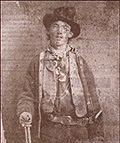
1881 - After a one-day trial, Billy the Kid is found guilty of murdering the Lincoln County, New Mexico, sheriff and is sentenced to hang. The shooting took place in the context of the bloody Lincoln County War, a battle between two powerful groups of ranchers and businessmen fighting for economic control of Lincoln County. When his boss, rancher John Tunstall, was murdered before his eyes in February 1878, the hotheaded young Billy swore vengeance. Unfortunately, the leader of the men who murdered Tunstall was the sheriff of Lincoln County, William Brady. When Billy and his partners murdered the sheriff several months later, they became outlaws, regardless of how corrupt Brady may have been.
1898 - Towering vocalist Paul Robeson is born in Princeton, N.J. His astonishing voice graced the definitive 1928 recording of Ol' Man River, he acted in plays by Shakespeare and O'Neill, and tirelessly campaigned for civil rights.
1914 - The first ever color feature film, The World, the Flesh, and the Devil, opens at the Holborn Empire in London. The colour system used was called Kinemacolor.
1926 - Playboy publisher, Hugh Hefner is born.
1928 - Tom Lehrer, song parodist and Harvard mathematics professor is born in New York City. He was a prolific songwriter, his many songs including The Old Dope Peddler, The Vatican Rag, We Will All Go Together When We Go, and, of course, We're Having Hanukah in Santa Monica. His first record, Songs by Tom Lehrer, was recorded in 1953 for $15.
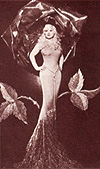
1928 - Mae West makes her debut on Broadway in the production of Diamond Lil.
1932 - Carl Perkins is born in Tiptonville, TN. The Rock and Roll Hall of Famer is best remembered for his hit Blue Suede Shoes.
1953 - TV Guide is published for the first time.
1953 - Warner Brothers, the first of the major Hollywood studios to introduce 3-D motion pictures, chooses this day to premiere The House of Wax at the Paramount Theatre in New York City. The stage show preceding the movie is headed by singer Eddie Fisher. The film’s stars, Vincent Price, Phyllis Kirk and Frank Lovejoy attend the premiere.
1954 - Actor and songwriter Dennis Quaid is born. His prolific work includes roles in Dragonheart, Wyatt Earp, Postcards from the Edge, Everybody’s All-American, The Right Stuff, The Long Riders, Breaking Away, The Big Easy and The Rookie. His songwriting credits include a contribution to The Big Easy soundtrack.
1956 - Gene Vincent records Be-Bop-a-Lula.
1956 - Nat 'King' Cole is attacked and severely beaten by a group of racial segregationists while he was singing onstage at the Municipal Hall in Birmingham, Alabama.

1959 - Frank Lloyd Wright, influential American architect, dies. His buildings include the earthquake-proof Imperial Hotel in Tokyo and the Guggenheim Museum of Art in New York.
1959 - NASA announces the selection of America's first seven astronauts.
1962 - President John F. Kennedy throws out the ceremonial first pitch in Washington D.C.’s new stadium, called simply D.C. Stadium (later to be known as Robert F. Kennedy, or RFK Stadium). In so doing, he continues a long-standing tradition which began in 1910 when President William H. Taft threw out Major League Baseball’s first opening-day pitch in Washington D.C.’s old Griffith Stadium.
1962 - The Hollywood musical West Side Story, an updated Romeo and Juliet tale set in gang-ridden New York, sweeps the 34th Annual Academy Awards held at the Santa Monica Civic Auditorium in Los Angeles and hosted by comedian Bob Hope. The movie, based on the Broadway hit by Leonard Bernstein and Stephen Sondheim, wins 10 Academy Awards, including Best Picture, Best Supporting Actor and Actress, and Best Director.
1963 - Winston Churchill becomes the first honorary U.S. citizen.
1965 - Bruce Johnston joins the Beach Boys as a touring replacement for Brian Wilson.
1965 - The Rolling Stones make their first live appearance on British TV's Ready Steady Go!
1966 - Jeff Beck collapses onstage while the Yardbirds are playing France.
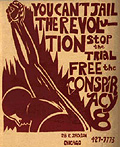 1967- The Doors perform at the Cheetah on the Santa Monica Pier, Venice, CA. 1967- The Doors perform at the Cheetah on the Santa Monica Pier, Venice, CA.
1969 - The Chicago Eight, indicted on federal charges of conspiracy to incite a riot at the 1968 Democratic convention in Chicago, plead not guilty. The trial for the eight antiwar activists had begun in Chicago on March 20. The defendants included David Dellinger of the National Mobilization Committee (NMC); Rennie Davis and Thomas Hayden of the Students for a Democratic Society (SDS); Abbie Hoffman and Jerry Rubin, founders of the Youth International Party ("Yippies"); Bobby Seale of the Black Panthers; and two lesser known activists, Lee Weiner and John Froines.
The trial, presided over by Judge Julius Hoffman, turned into a circus as the defendants and their attorneys used the court as a platform to attack Nixon, the war, racism, and oppression. Their tactics were so disruptive that at one point Judge Hoffman ordered Seale gagged and strapped to his chair. (Seale's disruptive behavior eventually caused the judge to try him separately). When the trial ended in February 1970, Hoffman found the defendants and their attorneys guilty of 175 counts of contempt of court and sentenced them to terms ranging from two to four years. Although declaring the defendants not guilty of conspiracy, the jury found all but Froines and Weiner guilty of intent to riot. The others were each sentenced to five years and fined $5,000. However, none of the defendants served time because in 1972 a Court of Appeals overturned the criminal convictions and eventually most of the contempt charges were also dropped.
1970 - Paul McCartney decides to quit the Beatles. He would announce his departure the following day.
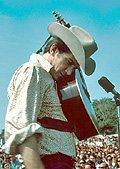
1976 - Singer-songwriter Phil Ochs dies in Queens, New York. Born in 1940, Ochs was one of the most popular singer-songwriters of the 1960s, known for his adamantly left-wing folk songs. After years of recording protest songs in the United States, he moved to Europe, where he wandered the continent for years, writing articles and songs. He suffered from manic-depression, taking his own life by hanging at the age of 35.
1976 - The U.S. and Russia agree on the size of nuclear tests for peaceful use.
1977 - At Chicago Stadium, Jimmy Page collapses onstage with stomach cramps one hour into a Led Zeppelin concert. It's the last time the band plays the Windy City.
1977 - The Swedish pop group Abba makes its debut at number one on the American pop charts, as Dancing Queen becomes the most popular record in the U.S.
1979 - Drama and war headline the films winning most of the awards at the 51st Annual Academy Awards ceremony at Los Angeles’ Dorothy Chandler Pavilion. The Best Picture, The Deer Hunter, also wins for Best Director (Michael Cimino); Best Supporting Actor (Christopher Walken); Best Film Editing (Peter Zinner); and Best Sound (Richard Portman, William McCaughey, Aaron Rochin, C. Darin Knight). The Best Actor and Actress awards for performances in Coming Home are awarded to Jon Voight and Jane Fonda, respectively.
1984 - Johnny Carson uses his own terms of endearment to bring laughter to the TV audience and the audience in attendance at the Dorothy Chandler Pavilion, Los Angeles. It's the 56th Annual Academy Awards, and Terms of Endearment (James L. Brooks, producer) is voted Best Picture of 1983.
1988 - Dave Prater of Sam & Dave dies in a car accident at age 50.
1989 - Hundreds of thousands march past the White House in support of the right to abortion.
1989 - Rolling Stones bassist Bill Wyman, 52, announces he is engaged to 19-year-old Mandy Smith, whom he has been dating for six years.
Doors History Spotlight: The Cheetah
1967 - The Los Angeles version of the Cheetah, patterned after the nightclub of the same name in New York, has just recently opened on March 21. The 3,750 capacity venue is located at the site of the old Aragon Ballroom in Santa Monica's Pacific Ocean Park, sporting a 7,000 square-foot dance floor bordered by stainless steel walls.
It is at the late show that Jim Morrison unveils his 'tightrope walk', precariously balancing himself as he walks along the edge of the stage. At one point he loses his balance and falls off the eight-foot stage into the audience. He continues to do his tightrope walk in other performances until one journalist sarcastically comments on how contrived it appears. Nevertheless, Morrison maintains a well-deserved reputation for risking life and limb on his dangerous jaunts along the ledges of buildings.
Happening magazine comments on these shows: "Robby picked their first Cheetah appearance as their most exciting show. 'We just got back from New York and everybody was waiting for us. Break On Through was out and people were turning onto the album. It was our first really big crowd.' Over 3,000 persons were at the Cheetah in Venice when Jim Morrison fell a good eight feet off the high stage during a wild rage." (Hank Zevallos, Happening magazine #5)
For more day-by-day history go to HistoryUnlimited.net
|
